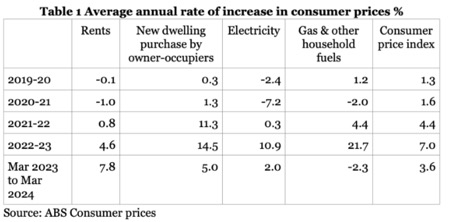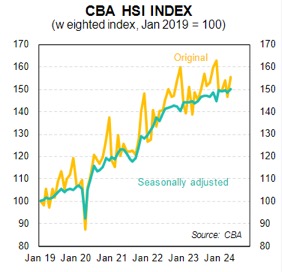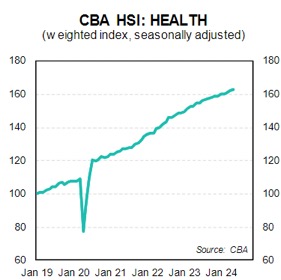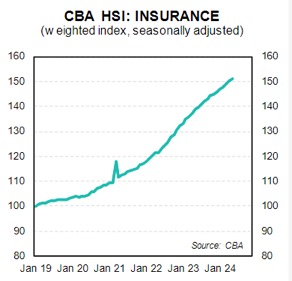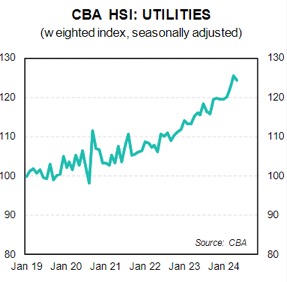Michael Pascoe: Dutton goes the full Trump

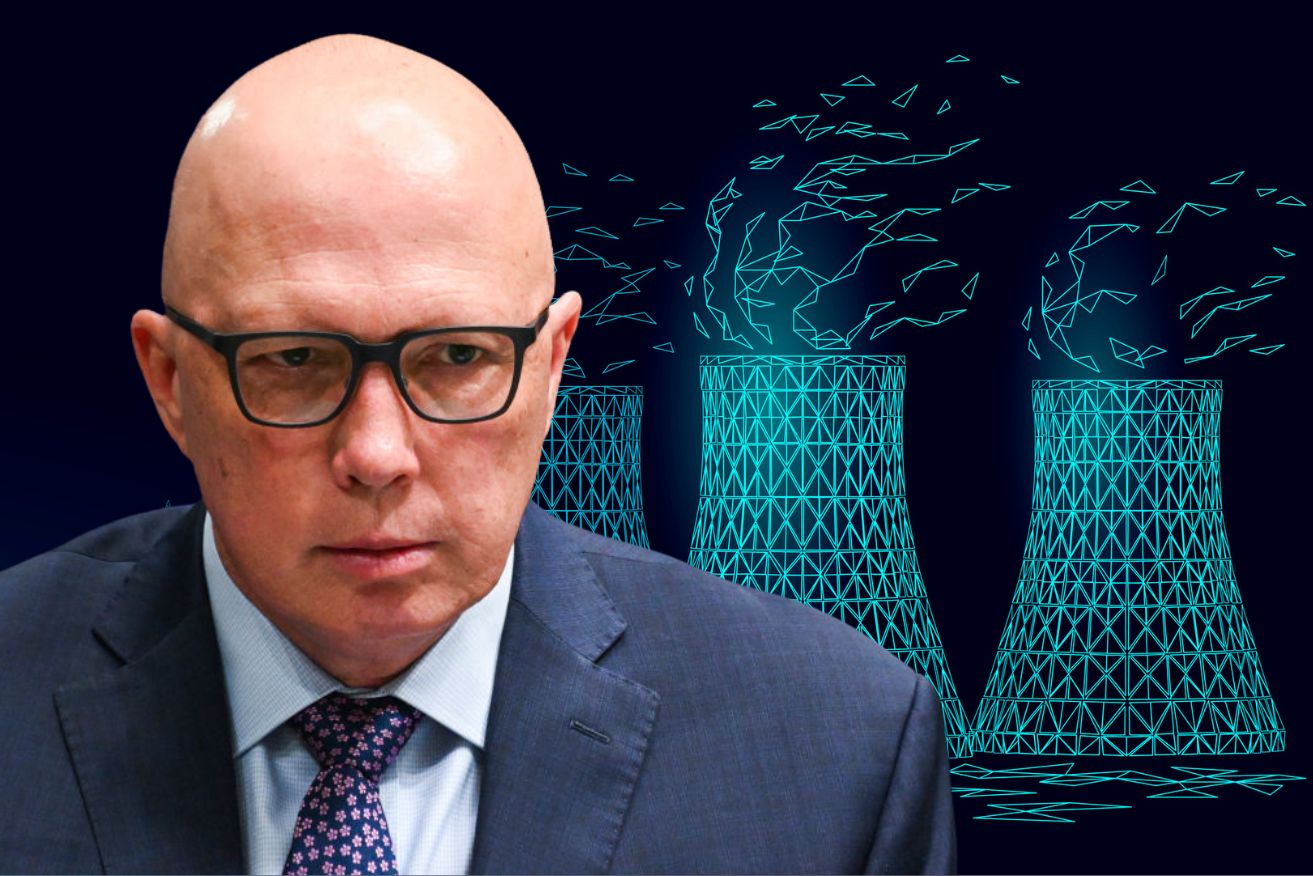
There is a Coalition political strategy to flood the zone with misinformation, Michael Pascoe writes. Photo: TND/Getty
As was made obvious on the ABC’s Insiders program on Sunday, Peter Dutton has gone full Trump – say anything to own the headlines, positive or negative doesn’t matter, truth and facts don’t matter.
There is no Coalition nuclear power “plan”. There is a Coalition political strategy to flood the zone with misinformation, mislead voters about the causes of our “cost of living” problems, and fuel uncertainty over energy policy.
It is a perfectly safe strategy, as Donald Trump has demonstrated.
The wild assertions are designed to be matters of faith, not fact. Figures can be concocted to claim whatever the perpetrator wants to claim. The lies can’t be definitively buried – the faith disproven – for so many years down the electoral track that it doesn’t matter.
Fossil fuels conspiracy
The common conspiracy theory attributed to the Dutton opposition attacking the renewables rollout and promoting nuclear power is that it’s a ruse to extend the life of fossil fuel generation, summarised neatly by Sydney Morning Herald/Age columnist Shaun Carney.
“The key to understanding Dutton’s crusade for nuclear energy is the deep belief, shared widely in the Liberal and National parties at the parliamentary and membership levels, that the theory of anthropogenic climate change and the consequent need to shift to renewables to avoid an existential threat, are bulldust – part of a global left-wing plot. The calculus is simple: It must be wrong and should be thwarted with whatever argument comes to hand.”
There is certainly that – just ask Matt Canavan – but the more immediate driver, the one carrying any remaining LNP members who might understand science, is to win an election.
Election goal
The tactic for doing that from opposition is to ask focus groups what most worries/angers them, feed that worry/anger back to the electorate, blaming the government for it, and propose a simple-sounding answer to the problem.
As HL Mencken taught: For every complex problem there is an answer that is clear, simple and wrong.
Being wrong doesn’t stop such an answer being effective politics.
The complex problem worrying/angering people is getting ahead, making financial ends meet aka “the cost of living”.
Neither the LNP or Labor has a simple answer for that.
The AFR reports Peter Dutton over the weekend telling the party faithful “a Coalition government would deliver a back-to-basics economic plan to rein in wasteful spending while delivering lower taxes and supporting small business”.
That’s the good ol’ LNP team song, always rousing in the clubhouse but meaning nothing much outside it. It’s not the simple answer for the focus groups.
Cunning pitch
The cunning bit of the LNP’s nuclear pitch is that it focuses the cost-of-living blame on energy prices and entices Labor to play on the LNP’s preferred ground.
That’s already worked, Prime Minister Albanese volunteering that he’s happy to debate nuclear every day from here to the election. That would suit Peter Dutton just fine – he has his simple answer.
We’ve been collectively telling ourselves energy prices are a big problem for so long, just about everyone believes it. Yes, we’re paying more now for our electricity and gas than we did back in the good old days, but energy costs are no longer the key inflation driver.
People on lower incomes and those being tortured on the mortgage rack by higher interest rates feel the pain of their energy bills acutely because there is no avoiding them. Their lumpy nature also makes them stand out more when the bank account is empty.
Unlikely reality
The unlikely reality is that, having surged in the 2022-23 financial year, energy inflation isn’t as evil it’s commonly portrayed and, come the federal and state energy rebates next month, will be less so.
More unlikely when we’re so used to being told our electricity prices are among the highest in the world, is that as a share of average household income, our energy expenditure is in the bottom quarter of major economies.
That’s no comfort for people with no savings copping a quarterly power bill, but a little perspective is healthy.
The Commonwealth Bank’s latest household spending insights report shows where the cost of living has really soared.
The May overall HSI index shows CBA customers’ spending is about 50 per cent higher than it was at the start of 2019, but the rate of increase has flattened as rate hikes have bitten. (And what increase there is of late is mainly thanks to population growth.)
What has risen further and isn’t slowing is that rather non-negotiable spending on health, up more than 60 per cent.
And then there’s insurance, pointing sharply higher after rising more than 50 per cent.
Spending on utilities – electricity, gas, water and local government charges – is up a relatively modest 25 per cent since 2019.
No, that’s not what all the nuclear and fossil fuels v renewables hot air might have led you to think.
As for the pain of higher housing prices, rent and mortgage payments, well, you already know that.
No answers
The Coalition has no answers for those problems, not even discernible policies other than one for housing which would actually make the problem worse.
So it makes political sense to fire up the climate wars under a nuclear guise, to go all Trumpy.
Coalition energy spokesman Ted O’Brien is the supposed author of the opposition’s nuclear balloon. I have my doubts. You would expect the author to have thought a bit about key elements of a “plan”, to have a clue about how many reactors will be required to make how much electricity, what percentage of the total energy mix.
Under questioning from David Speers on Insiders, it was soon evident Mr O’Brien didn’t have a clue beyond “nuclear good, renewables not good”.
Read more
In the May edition of The Monthly, investigative journalist Marian Wilkinson dug into where the conservative nuclear policy push is more likely to be coming from. (The Monthly is paywalled but you can have one free read a month. This is the one to read:
The Coalition for Conservation (C4C) and its patron, energy investor Trevor St Baker, appear to have their fingerprints all over what Ted O’Brien is struggling to grasp. (Mr St Baker is perhaps best known for buying the Vales Point coal-fired power station for $1 million in 2015 from the NSW government and selling it for $200 million seven years later.)
The Coalition is already trotting out plenty of half-truths and falsehoods, the biggest being the availability of small modular reactors and how soon any reactors could be built here, the Senate and state governments permitting.
In time, Messrs Dutton and O’Brien will come up with numbers from reports and studies they’ll say support their case. That’s why you hire consultants – to provide the numbers you want them to provide.
I think it’s a fair bet Trevor St Baker’s consultancy, SMR Nuclear Technology, will be among those being of assistance.
Energy mix
Personally, I think there’s a fair chance that, somewhere down the track, SMRs will play a part in Australia’s energy mix. Our energy needs will keep growing and, eventually, commercially viable SMRs may actually exist. At present, they don’t.
You just wouldn’t want to wait a couple of decades for that to happen to help keep your lights on.
Unless, of course, you’ve gone the full Trump and reality does not matter. Flood the zone.
